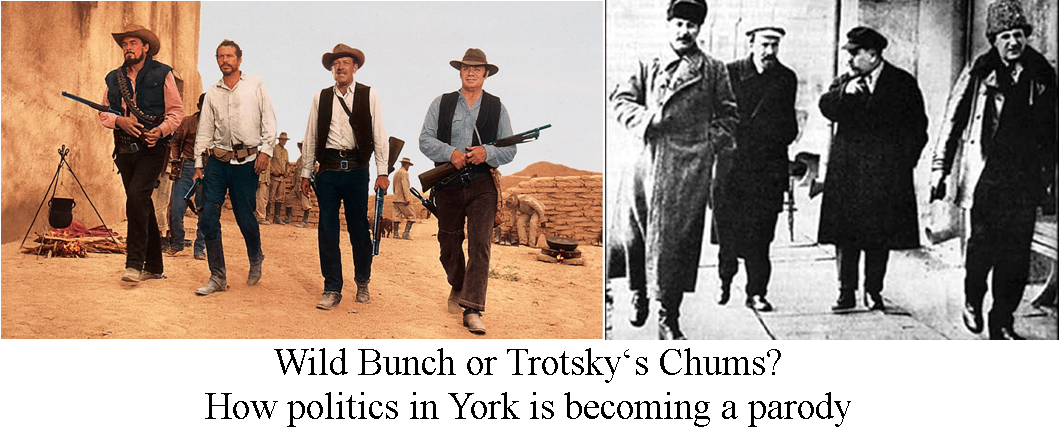It looks like the coalition, that has run the Council for the last 3 years, will be coming to an end.

The faction that plunged daggers into the back of the last Tory Leader are now re-sharpening their blades. They hope to cut into core public service standards in the City. Four right wingers, emboldened by national changes in the Tory party, are demanding low (or zero) Council Tax increases funded by a widespread close down of public services like libraries. They are disparagingly referred to by other, more moderate, Tories as the “Wild Bunch”.
On the other side of the Council, new Labour Councillors lack experience and historical perspective. They embrace a high tax, high borrowing philosophy. They cite “austerity” as the cause of all evils without actually explaining how any alternative would be funded (or even allowed by central government). Despite adopting locally the Corbynite tactic of never quite explaining their policies (e.g. Europe, single market, tax etc), the Labour group is clearly now far to the left of anything seen in the City during the last 60 years. Many experienced, moderate Labour representatives have quit, or are likely to face the “Momentum” ice pick, before the May 2019 Council elections.
So should the LibDems seek to reach an administration agreement with either of these Groups?
The answer is probably “yes”.
The City faces a difficult year. It is a time when Councillors, from all sides, should put York first. That inevitably means compromise and ideally seeking a broad consensus on dealing with issues.
The Council can now choose to revert to the committee system which was used to run the City until 1995. Councillors from all parties (and none) would be more directly involved in the decision making processes
Council officials – some of whom must bear some of the blame for the current crisis – will need to burn the midnight oil if an alternative constitutional model is to be made available in time for the Council’s annual meeting, which is scheduled to take place on 24th May.
They will not start with a blank sheet of paper.
There are many other Local Authorities who now operate using the committee model. These include the Nottinghamshire County Council (Tory/Ind majority), Kingston (Conservative), Sutton (LibDem), South Gloucestershire (Conservative), Brighton and Hove (Green when Committee system adopted, now NOC), Newark and Sherwood (Conservative), Barnet (Conservative), Norfolk (Conservative, NOC when Committee system adopted) & Reading (Labour)
Numerous smaller authorities never changed to the “Cabinet/Leader” governance model.
Some councils have chosen to create versions of the Leader/Cabinet system (which means that they do not require a formal change under the Act) that include aspects of the committee system.
The most common arrangement is to set up non-decision making group of councillors, usually corresponding to cabinet portfolios, which examine papers and make recommendations about how decisions should be made. This system worked in a balanced Council in York between 2007 and 2010 (Labour then decided that they would not participate) The decisions are subsequently made at meetings of the cabinet or by individual cabinet members, and may well follow the recommendations of the ‘committees’ although they are not legally required to do so.
Either way, it is time to put personal and party ambitions to one side and do what is best for the City.

 Yesterdays York Council meeting has piled pressure on the Artistic Director, of York’s soon to be unveiled Rose Theatre, to change the published cycle of Shakespearean plays.
Yesterdays York Council meeting has piled pressure on the Artistic Director, of York’s soon to be unveiled Rose Theatre, to change the published cycle of Shakespearean plays.
 The decision by York Tory Councillors to ditch the Council Leader last week
The decision by York Tory Councillors to ditch the Council Leader last week 


